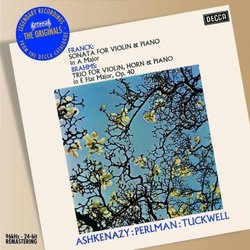A classic chamber music recording
Mike Birman | Brooklyn, New York USA | 10/26/2007
(5 out of 5 stars)
"The Sonata for violin and piano, possibly the most intimate form of an already intimate musical genre (chamber music), was brought to its first peak of excellence by Mozart with the Sonatas he composed in Mannheim in 1778. For the first time, the dialog between violin and piano was one of equals, the violin given more to do then merely fill space. Beethoven advanced this tradition with his masterful 10 sonatas. So when Cesar Franck wrote his Sonata for violin and piano in 1886, he was nearly 64 years old and a mature composer. The weight of Mozart and Beethoven was felt by all composers who followed them.
Franck's Sonata in A major is lyrical and warm, unfettered by the rules of Classicism. All four movements are linked together by thematic material that recur in Franck's much favored cyclic form. Franck's music sounds more Germanic than French, the influence of Brahms easily apparent in this relatively somber work. A more beautifully played Sonata is hard to imagine. The youthful Vladimir Ashkenazy and Itzhak Perlman play with passion and conviction (this was recorded well before the interpretive laziness that mars performances from their later years). They have absorbed this work and it shows. The opening Allegretto is particularly brilliant. The lovely melancholy of the third movement Recitativo-fantasia is played with elegaic finesse. This is exemplary playing in all respects, both musicians exhibiting the music's varied dynamics with great delicacy.
Brahms composed his Trio for violin, horn and piano in E-flat major, Op.40 in 1865 when he'd retired to the dark beauty of the Black Forest, making his headquarters in Baden-Baden. The Trio is mellow and expansive, with moments of both lyrical beauty and resigned melancholy. Barry Tuckwell plays the french horn with great subtlety in his dynamic shadings, his tone often somber and warmly burnished. His playing is especially lovely in the profound and sad third movement Adagio mesto. The horn part can be played by both a cello and a viola, but neither string instrument approaches the horn's beauty in this piece. Both Ashkenazy and Perlman partner Tuckwell splendidly. The sound of this 96kHz - 24-bit remastered 1969 recording is as warm and full as analog records used to sound. Comparing the original vinyl pressing to this CD, the better sound emanated from the CD. This, undoubtedly, is a result of the superior remastering of Universal's The Originals series. It is not usually the case.
These two important fruits of the Romantic era are beautifully played in performances that are unlikely to be soon bettered. If you are amenable to chamber music, this disc is most strongly recommended for its dark and lyrical beauty and as a portent of Brahm's future autumnal greatness.
Mike Birman"
Full of expression
Peter Chordas | Portland, OR USA | 04/04/2008
(5 out of 5 stars)
"This Franck piece flows beautifully from start to finish. The combined clarity and understanding between both Ashkenazy and Perlman generates complete balance in phrasing and smoothness in the lyricism. Perlman captures the lilting drama while the piano adds softness and a dream quality to it. I have never heard this piece better performed.
The Brahms also has a "swept off thy feet" sensation to it. A bit more energetic, it also flows beautifully and the french horn played by Tuckwell is another added delight.
To those who may not be familiar with classical chamber music, these pieces are a bit more cerebral than say Mozart or Haydns' music whose beauty and genius is often in the simplicity with a melody and themes that may be easier to follow. The formula here is more complex. But it is so full of emotion and expression that this coupled recording is really beautiful to listen to. If the first time through doesn't hook you, give it a few more times - it will."


 Track Listings (8) - Disc #1
Track Listings (8) - Disc #1